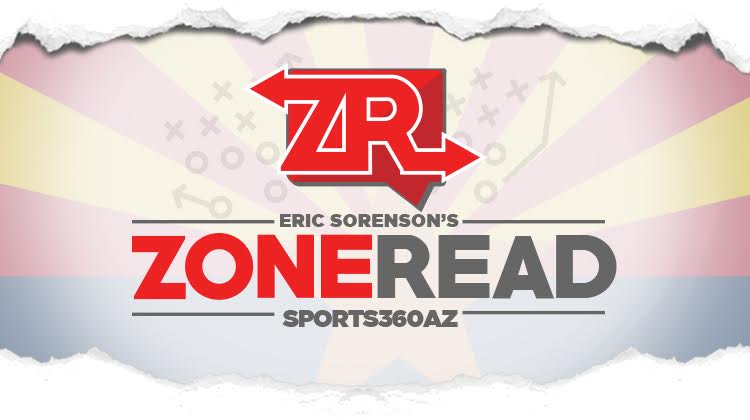That nationwide sigh of relief you heard earlier this week around midnight EST was the official ending of the college football recruiting dead period.
After over a year of non-campus visits and virtual recruiting, Division I coaches everywhere are now hopscotching around the country evaluating talent and extending offers, including here in Arizona where the high school football bar continues to rise as quickly as our early June Valley temperatures.
BACK N BUSINESS 🐻🐻#FTJ pic.twitter.com/RwJPQBvh0b
— Charlie Ragle (@RagleCharlie) June 1, 2021
As we’ve explained endless times in this column recruiting, and getting recruited, can be a tough puzzle to piece together for players, parents, and coaches.
The simple fact is: a handful of prep players in Arizona, and most other states, are – for one reason or another – simply under recruited.
Which leads into this week’s primary “Zone Read” topic: is it high school coaches’ “job” to help get their players noticed/offered?
I reached out to a number of head and high-level assistant coaches in Arizona to ask this exact question. Most answered, while others either declined, or opted to speak off-the-record on one of the more hot button, underlining issues in our AZHS football circles – especially with players transferring at an alarming rate.
They are listed alphabetically with the off-the-record responses at the bottom.
Brent Barnes (Head Coach – Chaparral)
“I absolutely feel it’s a part of our job to help our players in any way that we can. Colleges want to hear directly from head coaches in the recruiting process. No matter the level of the player, we always want to help give them as many opportunities to choose from when the time comes. It’s always a great feeling when you see a player find a great fit for them to continue on to the next level!”
After an unbelievable call with the goat Nick Saban, I’m beyond blessed to announce an offer from the University of Alabama #RollTide @AlabamaFTBL @ChapfootballAZ @CoachZoo90 pic.twitter.com/ej00H4dIyz
— Anthonylucas2022 (@Anthonylucas201) February 15, 2021
Mark Carter (Co-Head Coach – Desert Edge)
“I feel that helping student-athletes get noticed/recruited is part of the job. The head coach has the film. The head coach is the direct point of contact for the student-athletes so it would be somewhat mind-boggling for coaches to think otherwise. What recruiter is going to take the sole word of a parent? While Marcus (twin brother and co-head coach) and I have a recruiting coordinator (Steven Ortiz, Sr.), it helps with the load. At the same time, our communication is so constant and awesome we’re still involved throughout the entire process.”
〽️Y WAY. 🇵🇷💯🇵🇷 pic.twitter.com/VAccPAPDMx
— Steven Ortiz Jr (@1stevenortizjr) April 10, 2020
Rick Garretson (Head Coach – Chandler)
“Most of my assistant coaches are involved in the recruiting process of our varsity football team. Without question, it is a part of our job to help them reach their full potential and give them the foundation to land financial assistance at the next level. The majority of our football team enrolled at Chandler [want] to chase their dreams of playing college football.”
Jason Jewell (Head Coach – Brophy)
“It’s definitely part of the deal. That is why college coaches call us. We should do what we can to get kids that want to play to the next level. Ultimately, it is up to the college coach to extend the offer or not. [It] will be based off their football resume which is their film, their transcripts, and their measureables.”
Congrats Zac!!! https://t.co/VBHAjgJzXj
— Jason Jewell (@jason247scout) April 27, 2021
Jason Mohns (Head Coach – Saguaro)
“I 100% think it is part of my job! It’s part of the deal I have with my players: you bust your butt to help the team be successful, I’ll bust my butt to help create opportunities for you after your time at Saguaro is over.”
Joseph Ortiz (Head Coach – Cactus)
Just filled this out for my players/prospects! #goirish pic.twitter.com/3JjfsuhGJq
— Cobra Football (@CHSCobraFB) April 19, 2021
“I absolutely think it’s a part of the job. You’re trying to get every player you have to the next level in their lives. Not just for football. But I run the recruiting for our team. Sending out emails and reaching out to college coaches. That’s why I don’t have a recruiting coordinator because I feel it’s the job of the head coach to do that.”
Dusty Peace (Head Coach – Canyon Del Oro)
“I believe the process is authentic when the high school coach is involved. If college coaches really want to know the character of the players they are recruiting, the high school coach is the source.
On the other hand, a lot of responsibility is on the parents and players from Division II and below levels to do their research and self-advocation.
Yes, college coaches ask for our “recruiting list” but Twitter and players contacting coaches to get on their radar seems to be the method for lower level players. At the lower level, it is a two-way street – meaning coaches are looking for players but players need to look for programs, too.”
Ty Wisdom (Head Coach – Desert Vista)
“It’s absolutely a part of our entire staff’s job at Desert Vista to promote our players and give them the opportunity for exposure and help them in all aspects of the recruitment process.”
Big Year ahead for this guy, he’s putting in the work! #AGNB #ThunderHog https://t.co/R7XexUOYCf
— Coach Wiz (@Coach_Wiz3) April 26, 2021
Unnamed (Head Coach)
“This can be such a slippery slope to navigate. Of course, it’s my job and the job of our staff to do everything within our power and our college contacts to help players get to the next level but there are limitations which must be realized for some players. Division I dreams and Division I talent are two completely different things and when expectations aren’t met or skewed, it’s very difficult. That’s why communication between myself, my staff, players and coaches is so vital to ensure we’re proceeding in the right recruiting direction for everyone.”
Unnamed (Assistant Coach)
“Coaches have to be invloved heavily with guidance and communication between college coaches, players, and parents. It’s a humbling, difficult process if you’re not a top recruit and we have to provide help on the path.
What colleges are looking for hasn’t changed and even though the process is changing, it doesn’t change the students’ ability or measurables. Colleges still trust our input on a kids’ ability, but more importantly on their character and academics – so we have to be involved. I think we all want to be involved as much as time and ability permits.
The other challenge is the echo chamber we create on Twitter and social media that both helps and hurts the process. Looking what others have and comparing ourselves to them. That’s really hard for players and parents. Yet, we use Twitter ourselves to celebrate and promote our players and their successes.”


